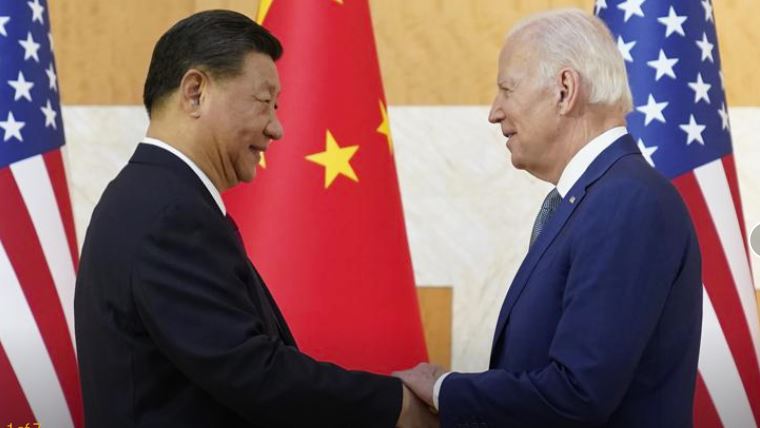Biden, Xi Engage in War of Words on Taiwan But Try to ‘Manage’ Differences
LAHORE MIRROR (Monitoring Desk)– President Joe Biden objected to China’s “coercive and increasingly aggressive actions” toward Taiwan during the first in-person meeting of his presidency with Xi Jinping, as the two superpower leaders on Monday aimed to “manage” their differences in the competition for global influence.
The nearly three-hour meeting was the highlight of Biden’s weeklong, round-the-world trip to Asia, and came at a critical juncture for the two countries amid increasing economic and security tensions. Speaking at a news conference afterward, Biden said that when it comes to China, the U.S. would “compete vigorously, but I’m not looking for conflict.”
He added: “I absolutely believe there need not be a new Cold War” with the rising Asian power.
Biden reiterated U.S. support for its longstanding “One China” policy, which recognizes the government in Beijing while allowing for informal U.S. relations and defense ties with Taipei, and “strategic ambiguity” over whether the U.S. would respond militarily if the island were attacked. He also said that despite China’s recent saber rattling, he does not believe “there’s any imminent attempt on the part of China to invade Taiwan.”
Xi, according to the Chinese government’s account of the meeting, “stressed that the Taiwan question is at the very core of China’s core interests, the bedrock of the political foundation of China-U.S. relations, and the first red line that must not be crossed in China-U.S. relations.”
Biden said he and Xi also discussed Russia’s aggression against Ukraine and “reaffirmed our shared belief” that the threat or the use of nuclear weapons is “totally unacceptable.” That was a reference to Moscow’s thinly veiled threats to use atomic weapons as its nearly nine-month invasion of Ukraine has faltered.
While there were no watershed breakthroughs, the meeting brought each side long-sought, if modest, victories. In addition to the oblique condemnation of Russian nuclear threats, Biden appeared to secure from Xi the resumption of lower-level cooperation from China on a range of shared global challenges. Meanwhile, Xi, who has aimed to establish China as a geopolitical peer of the U.S., got symbolic home turf for the meeting, and Biden’s forceful ‘One China’ policy commitment.
The White House said Biden and Xi agreed to “empower key senior officials” on areas of potential cooperation, including tackling climate change and maintaining global financial, health and food stability. Beijing cut off contacts with the U.S. in protest of House Speaker Nancy Pelosi’s trip to Taiwan in August. China and the U.S. are the world’s worst climate polluters, and their one-on-one climate contacts are seen as vital to staving off some of the most dire scenarios of climate change.
The two leaders agreed to have U.S. Secretary of State Antony Blinken travel to Beijing to continue the discussions.
Xi and Biden warmly greeted each other with a handshake at a luxury resort hotel in Indonesia, where they are attending the Group of 20 summit of large economies.
“As the leaders of our two nations, we share responsibility, in my view, to show that China and the United States can manage our differences, prevent competition from becoming anything ever near conflict, and to find ways to work together on urgent global issues that require our mutual cooperation,” Biden said to open the meeting.
Xi called on Biden to “chart the right course” and “elevate the relationship” between China and the U.S. He said he wanted a “candid and in-depth exchange of views” with Biden.
Both men entered the highly anticipated meeting with bolstered political standing at home. Democrats triumphantly held onto control of the U.S. Senate, with a chance to boost their ranks by one in a runoff election in Georgia next month, while Xi was awarded a third five-year term in October by the Communist Party’s national congress, a break with tradition.
White House aides have repeatedly sought to minimize any notion of conflict between the two nations and have emphasized that they believe the countries can work in tandem on shared challenges such as climate change and health security.
SOURCE: AP NEWS

